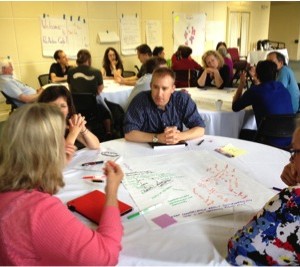In the news lately, I frequently hear commentators talking about how a particular event or action is unprecedented, such as three hurricanes so close together or the actions this Administration is taking to deregulate quickly. These times call for us to practice ‘collective sensemaking’ to more clearly see what is unfolding and avoid being caught in denial or wishful thinking. We may unconsciously use the same playbook that has worked before…when the game and territory have changed. This is time for key questions such as, What is changing? What is needed to respond now? What is now possible?
This sensitivity to a changing world is a key skill for ensuring longevity and resilience. Arie de Geus, who worked on strategic planning at Shell, got curious and researched corporations with long life spans. To his surprise, he found companies in Japan and Sweden that had existed for 700 years. In these companies, he found common patterns, manifested in unique ways in their context. As he wrote in Harvard Business Review, “living companies have a personality that allows them to evolve harmoniously. They know who they are, understand how they fit into the world, value new ideas and new people, and husband their money in a way that allows them to govern their future.” The four common characteristics he saw across many long-lived companies were:
- Sensitivity to the world around them
- Conservatism in financing
- Awareness of their identity
- Tolerance of new ideas.
Teams and organizations need to build their skills to do “collective sensemaking” in times of rapid change. They need to stay sensitive and responsive to a changing world. In an article entitled Sensemaking, by Debora Ancona, she writes that the term was created by Karl Weick, referring “to how we structure the unknown so as to be able to act in it. Sensemaking involves coming up with a plausible understanding—a map—of a shifting world; testing this map with others through data collection, action, and conversation; and then refining, or abandoning, the map depending on how credible it is.”
To do sensemaking effectively, it is crucial to synthesize multiple perspectives to  discern what is changing and what is needed next. No one person has the full picture and we all have blind spots or limiting beliefs. Cross-pollinating the view points, ideas, experiences, and wisdom of many people helps us to develop a clearer understanding of what is changing and see a wider range of potential responses. Leadership today calls for being receptive with the capacity to listen, seek out multiple stories and perspectives, and together find the signal amidst the noise.
discern what is changing and what is needed next. No one person has the full picture and we all have blind spots or limiting beliefs. Cross-pollinating the view points, ideas, experiences, and wisdom of many people helps us to develop a clearer understanding of what is changing and see a wider range of potential responses. Leadership today calls for being receptive with the capacity to listen, seek out multiple stories and perspectives, and together find the signal amidst the noise.
Some of the methods we use with groups for collective sensemaking include:
- World Café – Small group conversations, sharing stories, finding patterns, cross-pollinating, listening for themes – all these aspects of World Café help a group hear many perspectives and connect and distill ideas across them.
- 1-2-4-All – A similar exercise where people come up with ideas by themselves first, then share in conversation with a partner, then join a group of four.
- Open Space – After some initial cross-pollinating conversations, it is helpful to invite participants to suggest topics or questions to delve into further. This allows space for the inquiry to follow what is emerging. People interested in topics can find each other and take the inquiry further.
- Circle Process – With roots that stretch far back in human history and are kept alive in indigenous traditions, listening as each person speaks, sitting in a circle, offers a powerful way to listen for emerging insights and share learning with a group.
The outputs of sensemaking then need to translate into conversations about action in response to what is learned. This quote from Joseph Jaworski and Otto Scharmer speaks to the need for this sensemaking and adaptability, though I suggest taking it to the level of groups and communities as well:
“What distinguishes great leaders from average leaders is their ability to perceive the nature of the game and the rules by which it is played, as they are playing it.”
